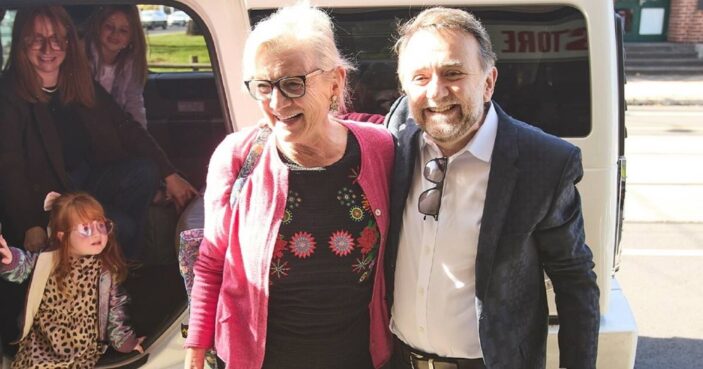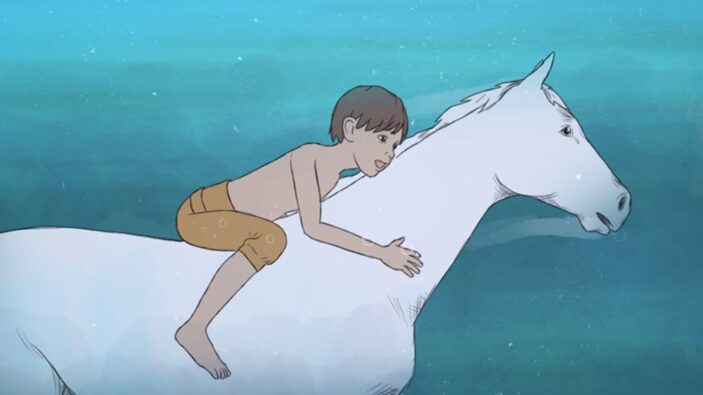
Take a trip with the ones you love through a unique mix of live action, entwined with extraordinary animated adventures that bring you to a dreamy seaside where anything is possible. Featuring timeless characters, Magic Beach is a captivating blend of reality and fantasy that inspires people of all ages to feel the sand beneath their toes and find wonder in the world around them.
After captivating children and families for 30 years, Alison Lester’s beloved book Magic Beach has been brought to life by director Robert Connolly and some of Australia’s leading animators, and to celebrate, Peter Gray spoke with both Alison and Robert about bringing such an ambitious book to the big screen, what they learnt about each other in a creative space during their collaboration, and the importance in facing your fears.
A lot of people have their own personal connection to Magic Beach. I wanted to ask you, Alison, has there been any fan interaction where you’ve heard from someone and they’ve shared their own story about what it means to them? And it’s stood out for you?
Alison Lester: Over the years I’ve had really touching messages from people, and I’ve met people who’ve used it at their wedding or someone’s funeral. I’m always so moved when it means so much to people. It’s really, really lovely.
Music is such a crucial element in the storytelling process here. Robert, how did you find the right musicality to enhance the story that we see?
Robert Connolly: Yeah, so each of the animators had their own composers. I needed to create a cohesive linking device, so I worked with composer Bryony Marks, who I’d done the TV show Barracuda with. She’s one of our great composers. And when I did Paper Planes, and I worked with Nigel Westlake, he talked about in that film about the recorder, and how all little kids had played the recorder. With Magic Beach, we played with a lot of tune percussion, like the vibraphone. And on the basis that most little kids know the xylophone, we had Ronnie (Bryony) compose a score completely from percussion. So, the framing of the story of the film is music from percussion, because it’s what kids use. It’s a very sophisticated use of it.
And you worked with a multitude of directors on The Turning. Was there anything that you learnt from the experience of so many collaborative voices that you brought with you to this film?
Robert Connolly: I learned, but I gained a lot of confidence from the learning, that I could trust creative people. That I didn’t have to be dictatorial. I could invite people to be a part of it. That there was a joy in letting people be as creative as they could. I remember Mia Wasikowska, who directed a chapter of The Turning, saying “When is someone going to call you up and say, ‘Here’s some money. Go and make a short film. Bring it back.'” She was all of 21 and it was one of the first things that she directed, and her work is extraordinary. It’s incredible. I think The Turning gave me the confidence on Magic Beach to invite all these animators and say, “Go away and do it.” And I trusted that they would. I knew they weren’t going to run away with the money. They won’t do anything inappropriate. All I found was that everyone exceeded my expectations.
Alison Lester: That’s the thing about trusting people. People will rise to the occasion when given the chance. If you’re too bossy about it, (the results) aren’t good.
Robert Connolly: I hadn’t thought of that, but that’s true. It’s like your kids. If you trust them, they feel the value in that. And I think, creatively, we just let these animators go bonkers. And that’s what they did.

And that’s all a part of the learning process. Did you feel that between the two of you, you learnt anything from each other about the creative process? About how the other person thinks that? And that you might take on yourself?
Robert Connolly: Oh, that’s easy for me. Alison’s made work for young people that young people love. They love it. Alison’s views on trusting children and not patronizing children, treating them respectfully and not filling in the blank…I found that all really inspiring.
On the mention of children, obviously we’re in a digital age now, and it feels like kids are playing less outdoors. Was there ever a conscious effort in making the film to highlight the joy of our own childhoods?
Robert Connolly: I definitely feel like I’ve been lucky as a director that I can connect to my early childhood quite easily. My favourite (segment) was making the bonfire with the marshmallows, and helping this little kid, and just the joy of being back in my pyromaniac childhood straight away (laughs).
Alison Lester: I feel like we have that in common, that we both feel very connected to that age of being little kids. I know some people don’t remember their childhoods. I don’t remember my teenage years very well, because I didn’t like them that much, but the being a child is still very strong in me.
Robert Connolly: Do you find have grandchildren keeps you there? Kids keep you honest (laughs).
You started off as an illustrator, Alison. Did you ever think you were going to take that leap to writing? What was it about Magic Beach that you made you finally put pen to paper and write something? That would be one of the hardest things to do.
Alison Lester: I wasn’t a very confident young person, and I just assumed there were a lot of jobs that I couldn’t do. And I think being a writer and illustrator were two of them. I trained as a secondary art teacher, and I soon found out that I didn’t actually like teaching all that much (laughs). Well, I didn’t mind teaching, but I hated having to go to school every day (laughs). I worked as an illustrator for about five years, and I just started getting really impatient with the manuscripts that I was illustrating. I was like, “Well, I wouldn’t have done it this way.” I was whinging one day to my editor, and she said, “Well, if you don’t like other people’s books, why don’t you write your own?”
I told her that I had an idea for one, and that was “Clive Eats Alligators”, and I wrote it down. I remember her telling me it was incredible it got published because there was really no story to it, which was very unusual in those days. She took it to acquisitions meetings and they all laughed at her, so I was lucky I had great editors who really helped me out. They really stressed to not write too much and keep it simple and clean and as beautiful as I could. Having those teachers really helped me.
When it comes to the Magic Beach, if the both of you could transport yourself to any one location or story, where would it be?
Alison Lester: I’d like to dive into those little rock pools and ride those dragons.
Robert Connolly: I’ve always loved the magic of the little caves you can walk around. Growing up near the Blue Mountains, I was not near the beach.
There’s that notion that if you’re afraid of something, it’s best to face your fear in some capacity. Has that helped both of you in putting your work out there creatively?
Robert Connolly: Yeah, I’ve always felt, and I remember someone early in my career said to me, “If you don’t have the courage to walk to the edge of complete and utter catastrophic failure, you will only ever do mediocre work.” I love the feeling of any kind of terror in a creative endeavour, and if I don’t feel it, it’s just a no that the work won’t have that little sparkle.
Alison Lester: I saw a quote from the coach of the Brisbane Lions when they won the grand final, and he said that “If you’re skating on the night, you might as well dance.”
Magic Beach is now screening in Australian theatres.
